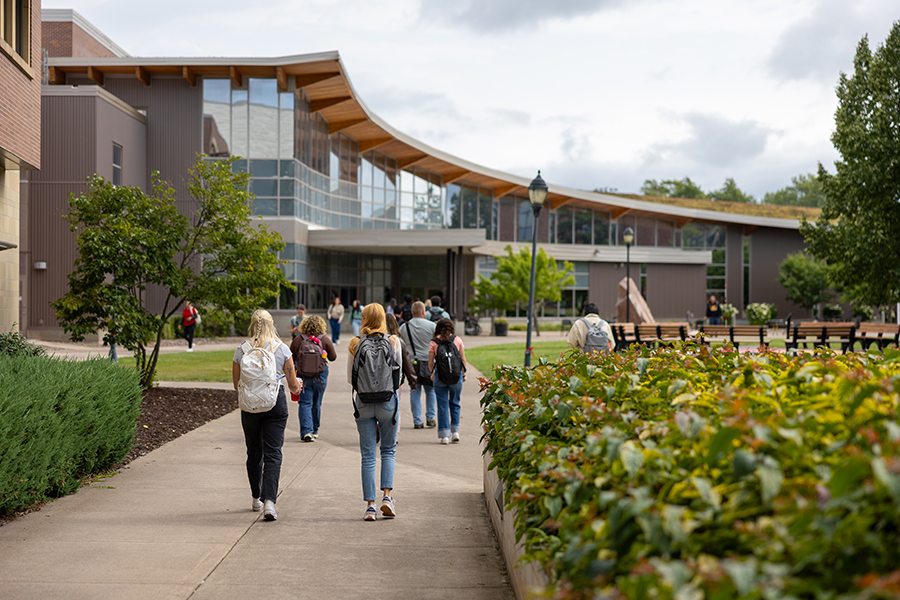TYPE
TOPIC
Before the first day of the fall 2025 semester at the University of Wisconsin-Superior, faculty and staff gathered in the Yellowjacket Union and virtually to learn about the reactive and responsive branches of mental health and well-being on campus.
The Opening Week Session on the Continuum of Care at UW-Superior provided information about the new staffing, initiatives, and exciting programs that the Pruitt Center for Mindfulness and Well-Being will be offering for faculty and staff, students and the greater community.
“We have some key materials and initiatives that we like to promote every year – things we want to get into people’s hands early and often to raise awareness about proactive, preventative services,” said Randy Barker, counseling services director for the Pruitt Center for Mindfulness and Well-Being at UW-Superior. “We also have some new initiatives we want to highlight focusing on the resources available right here on campus – which is a top priority for us.
“We always aim to highlight these services,” said Barker. “That part doesn’t really change. But we also want to keep informing people, because even after all this time, we still hear things like, ‘Wait – there’s a counseling service on campus? And it’s free?’ Yes – yes, we do have that.”
Campus Climate
Several years ago, a group at UW-Superior began looking into what was taking place on campus in regard to student mental health and well-being.
“We started to see an escalation in student behavior, escalations in student concerns and I was able to engage with the Universities of Wisconsin Board of Regents and others on this work,” said Harry Anderson, associate vice chancellor and dean of students at UW-Superior.
The creation of an optional student behavioral health survey brought those concerns to light. Many students reported anxiety, stress and depression as top reasons for seeking counseling. Those conditions had academic impacts for motivation, self-esteem, concentration and sleep issues. Similar findings occurred throughout the Universities of Wisconsin.
In 2019, then system president Ray Cross, following concerns raised by senior student affairs officers, created a goal to improve emotional health and well-being for students – supporting both personal and academic success built on a public health framework with three levels of intervention – prevention, early intervention and treatment and crisis. Each level is supported by campus professionals – counselors, health staff and student affairs experts – who collaborated across all 13 Universities of Wisconsin campuses.
UW-Superior’s proactive approach includes its 1-to-1,000 counselor ratio, screening of student athletes and housing staff, Healthy Minds app for students in the Health and Human Performance 102 course, and the Pruitt Center.
About the Pruitt Center
The Pruitt Center for Mindfulness and Well-Being at UW –Superior is dedicated to advancing the science and practice of mindfulness and well-being. Through events, classes and workshops, the center offers resources to both the campus and the wider community. Its mission is to make mindfulness and well-being accessible by providing practical research-based tools to help individuals manage stress, relationships and daily life. A key focus is fostering a sense of community through partnerships across campus and the region.
Doug and Becky Pruitt first proposed the idea of a mindfulness and well-being center to Chancellor Renée Wachter and Vice Chancellor for Advancement Jeanne Thompson in 2014. Becky, a 1965 UW–Superior alumna, has long been involved in mindfulness and well-being initiatives. She serves on the advisory board of the Greater Good Science Center at UC Berkeley and is affiliated with Arizona State University’s Center for Mindfulness, Compassion and Resilience.
In 2018, the Pruitts made the center a reality through a generous founding gift.
“We see UW–Superior as a gem in the Northland and believe the center has unlimited potential to benefit students, faculty, staff and the wider community,” said Becky Pruitt. “We’ve been very impressed with the center’s leadership and fully support its vision of becoming a hub for the entire university system and beyond.”
Livewell Initiative Expands Under Pruitt Center
Recently, the Pruitt Center joined forces with LiveWell Northern WI to better serve community needs. Now known simply as LiveWell, the initiative is expanding its reach and impact under the Pruitt Center’s leadership.
“This partnership significantly increases our capacity to organize and participate in meaningful activities for both students and the community,” said Lynn Goerdt, social work professor and LiveWell coordinator. “While most events will still take place in the Superior area or on campus, we’re also growing our presence in Minnesota, where many of our students and staff live. Our missions align naturally – both focus on improving well-being.”
Since its launch in fall 2022, LiveWell has hosted events such as yoga, pickleball, walks, art classes, beach sauna and cold plunge, upcycling workshops and many more. Led by UW–Superior faculty and staff and supported by partners such as the Miller-Dwan Foundation, Essentia Health St. Mary’s–Superior Hospital, the Superior Rotary and others, the program fosters community connection, joy and wellness.
LiveWell’s integration into the Pruitt Center opens new opportunities to promote well-being throughout the region. Key programs include #BetterTogether events that encourage connection, and Gatekeeper Trainings, which equip participants with suicide prevention and mental health awareness skills.
Reactive Response Services
UW-Superior’s Student Health and Counseling Services (SHCS) is committed to providing safe, welcoming and affirming environments for all students. Its confidential counseling services are free and available for on-campus and online students. SHCS also partners with several off-campus health service providers that offer services specifically for UWS students.
New this school year is access to Mantra Health. With the ability to provide students with comprehensive, high-quality mental health and wellness solutions, Mantra is available to both on-campus and online students at any time and any day of the week. The new supplemental services funded by the Universities of Wisconsin “Complete Care,” includes expanded tele-mental health services, 24/7 crisis support, wellness coaching and peer support.
“We’re very excited to be talking about this Universities of Wisconsin initiative to really support supplemental care in regards to mental health and well-being,” said Barker.
